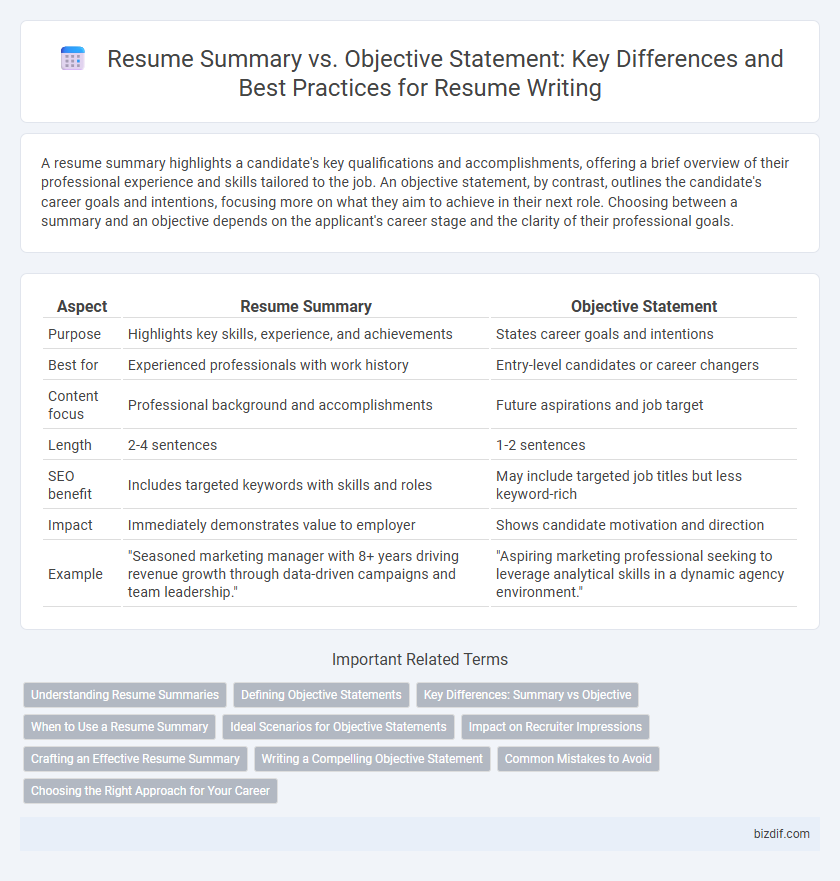A resume summary highlights a candidate's key qualifications and accomplishments, offering a brief overview of their professional experience and skills tailored to the job. An objective statement, by contrast, outlines the candidate's career goals and intentions, focusing more on what they aim to achieve in their next role. Choosing between a summary and an objective depends on the applicant's career stage and the clarity of their professional goals.
Table of Comparison
| Aspect | Resume Summary | Objective Statement |
|---|---|---|
| Purpose | Highlights key skills, experience, and achievements | States career goals and intentions |
| Best for | Experienced professionals with work history | Entry-level candidates or career changers |
| Content focus | Professional background and accomplishments | Future aspirations and job target |
| Length | 2-4 sentences | 1-2 sentences |
| SEO benefit | Includes targeted keywords with skills and roles | May include targeted job titles but less keyword-rich |
| Impact | Immediately demonstrates value to employer | Shows candidate motivation and direction |
| Example | "Seasoned marketing manager with 8+ years driving revenue growth through data-driven campaigns and team leadership." | "Aspiring marketing professional seeking to leverage analytical skills in a dynamic agency environment." |
Understanding Resume Summaries
Resume summaries provide a concise overview of a candidate's key skills, experiences, and achievements tailored to the job description, enhancing relevance and impact. Unlike objective statements that focus on career goals, resume summaries emphasize professional value and qualifications, making them more effective for experienced candidates. Crafting a strong resume summary involves highlighting measurable accomplishments and specific expertise to capture employer attention quickly.
Defining Objective Statements
Objective statements in resumes clearly define a candidate's career goals and the specific role they seek, focusing on what the applicant aims to achieve within the company. These statements are typically concise, highlighting the candidate's intentions rather than their qualifications or accomplishments. Unlike a resume summary, which emphasizes skills and experience, an objective statement centers on future professional aspirations tailored to align with the employer's needs.
Key Differences: Summary vs Objective
A resume summary highlights a candidate's professional experience, skills, and achievements, providing a concise overview of qualifications tailored to the job. An objective statement focuses on the applicant's career goals and the position they seek, often used by entry-level candidates or those changing careers. Unlike objective statements, summaries emphasize value and past performance, making them more effective for experienced professionals.
When to Use a Resume Summary
A resume summary is ideal for professionals with extensive work experience or significant accomplishments, providing a concise overview of key skills and achievements that match the job requirements. It highlights expertise quickly for hiring managers in industries such as technology, finance, or healthcare where demonstrated results matter. Use a resume summary when transitioning roles within the same field, aiming to emphasize career growth and relevant qualifications over entry-level motivations.
Ideal Scenarios for Objective Statements
Objective statements in resumes are ideal for entry-level candidates or those switching careers, as they clearly express specific career goals and intentions. These statements help align the applicant's ambitions with the job role, providing recruiters with insight into the candidate's focus and motivation. Objective statements work well when targeting a particular position or industry, emphasizing the candidate's drive and desired contribution.
Impact on Recruiter Impressions
Resume summaries highlight key skills and achievements, creating an immediate positive impression by showcasing relevant experience and value to recruiters. Objective statements often focus on the candidate's career goals rather than employer needs, which may result in a less impactful first impression. Recruiters typically favor summaries for their concise demonstration of how candidates can contribute effectively to the organization.
Crafting an Effective Resume Summary
Crafting an effective resume summary requires highlighting key skills, achievements, and professional experience that align with the job description, delivering a concise snapshot of your qualifications. Unlike an objective statement, which focuses on career goals, a resume summary emphasizes your value to employers through measurable accomplishments and relevant expertise. Use strong action verbs and quantifiable results to create a compelling summary that captures attention and increases interview chances.
Writing a Compelling Objective Statement
Crafting a compelling objective statement requires clear articulation of career goals aligned with the employer's needs, emphasizing specific skills and relevant experiences. A well-written objective statement should be concise, targeted, and demonstrate how the candidate's ambitions support the company's mission or role requirements. Employing industry-specific keywords and measurable achievements enhances the effectiveness of the objective, capturing recruiters' attention quickly.
Common Mistakes to Avoid
Common mistakes in resume summary and objective statements include using vague language, focusing on personal goals rather than employer needs, and failing to tailor the content to the specific job. Overloading the summary with generic buzzwords or writing objectives that are too broad can undermine the resume's effectiveness. Clear, concise, and targeted statements demonstrate value and align with hiring managers' expectations.
Choosing the Right Approach for Your Career
A resume summary emphasizes your professional achievements and skills, making it ideal for experienced candidates seeking to highlight their career highlights. An objective statement focuses on your career goals and aspirations, which suits entry-level applicants or those changing industries. Selecting the right approach depends on your experience level and the job you are targeting to effectively convey your value to employers.
Resume Summary vs Objective Statement Infographic

 bizdif.com
bizdif.com